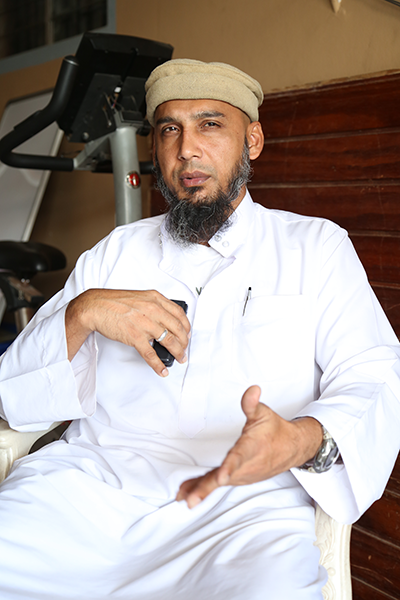(Trinidad Guardian) Spending hours in a “stink” morgue, being called “Taliban”, thinking of getting shot in the head by officers—memories of Venezuela that have left Hamza Mohammed, imam of the Montrose mosque, still trembling today. In an interview at his Chaguanas home last week, Mohammed, who recently returned home after his 55-day detention in Venezuela, recounted his experience to the T&T Guardian.
Although he was not physically harmed, Mohammed said the fright and dishonour he experienced left deep emotional scars which were taking time to heal. “After court one day, in the evening, they took us to a place—a morgue. From the time we entered that building, the place was so stink…dead bodies were there. Just being there and smelling those things was really messed up,” Mohammed said.
“They gave us these clothes to put on like what doctors wear at the hospital (disposable hospital gowns) and spent about two hours on each person doing detailed measurements of different parts of your body.” In a country under a state of emergency and unable to understand the language, Mohammed was left to think the worst on many occasions.
In recalling one of his trips to the court, he said: “I was in a van alone with four other officers who had their guns on their lap. I didn’t know where we were going. All kinds of things ran through my mind. I started to pray hoping that these people weren’t carrying me somewhere to put bullets in my head.”
A respected man in his community, Mohammed remembered the countless times he cried due to humiliation. “Just going into the big truck to court, the sound of the siren and the attention it drew from the people outside, and the feeling that everybody out there thinks we’re criminals made me cry all the way.”
At one of their three court appearances, Mohammed and the other two imams were greeted with loud jeers as they made their way to the holding cell. “We were walking down the aisle between the jail cells and everybody started shaking the gates, shouting ‘Taliban, Taliban, Taliban,’ and I just bent my head. That was really embarrassing.” “To know that in Trinidad I’m a man looking after the needs of people as an imam and then I had to go through this. It affected me really badly, emotionally.”
A father of six, Mohammed said the most painful part of his time in Venezuela—a stay which supposed to last two days but turned into two months—was being away from his family. “I am a family man and all I could have thought about was my family. They are everything to me.” But there were a few memories that brought smiles for Mohammed. “We would play tennis with the other prisoners and they used to call me the tennis champ. The Venezuelan prisoners shared snacks with us and one of them drew a sketch of me.”
On exiting the prison, the imam’s honour was restored, as all the prisoners lined up and clapped. “To see the love and respect they had for us made it sad to leave.” Asked how he was coping now, he replied: “It’s difficult. I thought it would have been easier but moments of the day and night take your thoughts back. I’m trying to come out of this mental state but it’s really hard…It’s like part of me.”
Mohammed expressed concern for the Trinidadians still detained in Venezuela, saying he hoped that they were freed soon and would be able experience the same feeling as he did on returning home.






